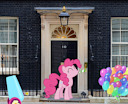Motivation's Such An Aggravation · 7:13pm Apr 27th, 2021
Talk
We love to talk about things we’re in the process of trying to bring to life. Discussing it makes it more of a solid entity in your mind, makes it feel more like a thing that exists in the real world.
This is why all those fucking questionnaires ask about ‘your crush.’ Because talking about it makes ‘you + them’ feel more real. Like it’s a bond that actually matters, rather than just a yearning in your groin. Even if all the feedback you get is negative (“No, you and that girl would never work out, she’s married and pregnant and gay”), the very fact of other people having opinions about it means it’s something solid enough for opinions to be had on.
So we like to talk about our stories. That’s natural. And for plenty of other reasons, it really helps. But there’s this downside, too, and it’s important to bear in mind: talking about things you’re in the process of creating kills your motivation to keep going with them.
All those great stories you want to write? They already exist, in your head. You write them down to bring them into the real world. The desire to bring them into the real world is what motivates you to write. Finding another way to make them feel real, like talking about them a lot, will make that creation process less important.
This also goes for choosing cover art for them, writing descriptions and all that.
Time
There is an optimal time window for creating a story. We’ve all seen the authors who write story after story, churning them out in a short period with no break between completing them and diving into the next one. My general feeling is that these authors would seriously benefit from spending more time evaluating and thinking about a story after finishing it, and would improve much faster, because they’d analyse their mistakes and work out how to not make the same ones next time.
And then, within each story, it’s certainly important to plan stuff out, to have some idea of what will happen when. If the brilliant idea only occurs to you when the story is half done, you’ll have to rewrite or adapt like crazy if you want it to fit.
So there’s definitely a minimum time period you shouldn’t go below on a story.
But excitement only lasts so long. You rarely see short stories abandoned on the site because they just don’t take that long to write, so the burning desire to tell them gets the job done. The longer ones, though, which take more time? They can be very tricky. After a while an idea loses its shine, but if there’s still half a story to go then you can only rely on stubbornness to get it finished.
And if you take a really, really long time over a story, you might find that the later bits look a lot better than the earlier bits, because you’ve improved noticeably as a writer over that period. And it’s the early bits, of course, that prospective readers will judge for whether to keep reading.
So think about your story before writing, but not for too long. Write it while the idea is exciting, but try to figure out what it will look like beforehand.
Tits
I couldn’t think of an appropriate section heading beginning with T, so I didn’t. The final point is to recognise which parts of writing are enjoyable, because those are the bits that will help spur you to continue. Brainstorming is fun, whether on your own or with a friend, because there’s a lot of creativity. Editing is not, because there’s no creativity at all and it’s all technical. Add to that that you’ve finished the writing bit so you’re raring to go, but you know you have to edit it first, so it always feels like putting the brakes on something when it’s almost there. Same with coming up with descriptions, art, titles etc.
Writing is in between, depending on how you approach it. In theory, a more planned-out story will be better. The different elements will fit together better. There’ll be less needing to go back and change things. But the more you plan, the more you constrain what can happen in each chapter. You have to create the details of the story at some stage, and if you do it when planning, you won’t have so much to do when actually writing. And, like I said, it’s creating that’s the fun bit that pushes you to continue.
I write dialogue much better when it’s planned out in advance. I often write dialogue-only versions of scenes, and then the actual writing bit is basically fleshing them out with prose. It’s great to have a skeleton like that to know what’s happening, and it can lead to much sharper conversations.
But it also takes a lot of the fun out of writing. No one enjoys writing the ‘she said’s as much as they enjoy writing what she actually said. So there’s a balance to be found there.
And below all of this, below editing and dialogue tags and short descriptions, is rewriting.
Rewriting is actively going back and destroying something you enjoyed creating but wasn’t up to scratch or doesn’t fit with something else. It’s like negative progress. No fun at all. Because of that, sometimes planning is worth the price of spontaneity.
Twelve
But breaking rules works sometimes, and there’s nothing saying all your stories have to be the same. Often the more spontaneous ones feel fresher and more alive, so do better. The Hobbit was purely spontaneous. So was the first chapter of Fairy Gothmother, and that took one night to write while the last one took eight months.
Find the right balance.




I'm unsure what to make of some of this. I'm quite wary in general of explaining how things are bad by saying they're not fun, or some equivalent. Because it's, like, how do you know whether that applies to other people? I'm doing the dialogue skeleton a lot more, recently, because I do find I feel a lot better about writing when I know the scene's going in a good direction. So having that bit of planning makes me a lot more confident and means I actually end up enjoying the scene more. And I don't always have a perfect image of what the blocking accompanying the dialogue's gonna be, so there's still at least some room for stuff that sounds good in the moment.
Same can go for rewriting. A lot of the time I find I need to kind of dig things out and figure how stuff fits together as I go, so approaching something again but with a much clearer vision for it... yeah, sometimes that's more fun and I feel a lot better about it.
Which isn't to say that experience is universal. Just that I don't particularly like the assertion that these things "aren't fun." They can be, certainly, but they can also be the opposite.
I do absolutely agree that the balance is the important part, though. I'm very much of the mind recently that if you're having chronic productivity issues, it means your methodology probably isn't working for you and you need to change it. And it's not always clear how. I've seen advice that I wrote off in the moment as not being for me, but then maybe a year later or more I'm in a funk and think back to it and it clicks with me and I get stuff done better. So, yes, balance is important and something to be fiddled and experimented with.
5507988 Variety between people of what they find fun is probably a good thing I am glad you enjoy those things!
I am glad you enjoy those things!
And I'm glad the dialogue skeletons are seeing more use and working out well for you, I think they almost always lead to better stories. Those stories just might take a bit longer to write. Maybe it depends on the scene and story in question, but dialogue is usually by far my biggest priority in any scene it exists in, so the other elements aren't really significant enough to count for much in terms of creative satisfaction for me.
Perhaps the focus should have been on ways to find the fun in the boring bits, it sounds like you've managed that in some areas I haven't so that can only be a good thing